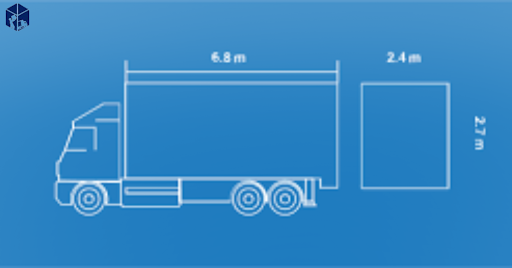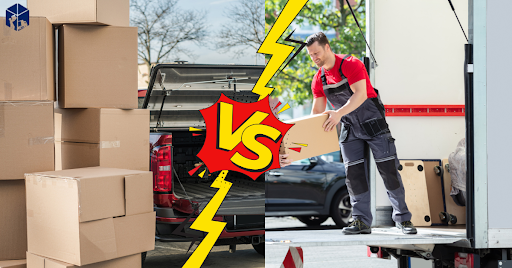Moving to a new home can be exciting, but it also comes with its challenges. One of the biggest decisions you’ll face is choosing the right moving truck for the job. Whether you’re relocating from a studio apartment to a two-bedroom house or moving to another state, understanding your options will make the process much easier. In this guide, we’ll take a deep dive into the different types of moving trucks, helping you pick the best one based on your needs.
Why Choosing the Right Moving Truck Matters
Selecting the right moving truck isn’t just about getting from point A to point B. The wrong choice could lead to unnecessary stress, higher costs, and damage to your belongings. For instance, choosing a truck that’s too small can mean multiple trips, while a truck that’s too large might cost you more in fuel. Understanding truck options, sizes, and features can save time, money, and hassle in your move.
Understanding Truck Measurements: What You Need to Know
Before diving into the specifics of moving trucks, it’s essential to understand truck measurements. The size of the truck is measured in cubic feet, which refers to how much space is available for your items. A 10-foot truck typically offers around 350-400 cubic feet, while a 26-foot truck offers a spacious 1,600 cubic feet or more. Knowing these measurements helps ensure you pick a truck that can comfortably fit all your belongings without too much extra space.
Types of Moving Trucks
There are several types of moving trucks to consider, each suited to different needs.
1. Pickup Trucks
Pickup trucks are often used for smaller moves, like relocating a studio apartment or a few furniture pieces. These trucks offer good fuel efficiency and are easy to maneuver in tight spaces like narrow streets. However, they lack the storage capacity needed for larger moves.
2. Cargo Vans
Cargo vans are another great option for small moves, such as transporting a 1-bedroom apartment or home improvements. These vans are versatile and can handle the typical load of furniture and appliances for smaller households.
3. Box Trucks
Box trucks, also known as cube trucks, are larger and more enclosed, making them ideal for larger moves. With various sizes available (ranging from 14-foot trucks to 26-foot trucks), these trucks are suited for everything from 2-bedroom apartments to 4-bedroom houses. They typically offer better storage capacity and protection for your belongings.
4. Semi-Trucks
For very large moves, such as moving a whole office or multiple homes, you might need a semi-truck. These trucks can carry a huge amount of weight and are often used for long-distance moves. However, driving a semi-truck requires special licensing and experience, so it’s best to hire a moving professional if you go this route.
Key Features to Consider When Choosing a Moving Truck
When selecting a moving truck, several features should be on your radar:
1. Size and Dimensions
One of the most important factors to consider is the size of the moving truck. Will it fit all your belongings? Make sure to check the truck measurements to see if they match your needs. Use online calculators to estimate how much space you’ll need based on your furniture and other items.
2. Load Capacity
The load capacity of a moving truck refers to how much weight it can carry. Ensure that the truck you choose can handle your belongings, especially heavier items like a sofa, fridge, or treadmill. Check the Gross Vehicle Weight Rating (GVWR) to ensure you don’t overload the truck.
3. Fuel Efficiency
Depending on the travel distance, fuel can become a significant part of your moving costs. Choose a truck rental that offers the best MPG to keep fuel costs down. Trucks with diesel engines often offer better fuel efficiency, especially for long-distance moves.
4. Ramp vs. Liftgate
For loading and unloading, you’ll need to decide between a ramp and a liftgate. A ramp is suitable for smaller moves, but if you’re handling heavy furniture, a liftgate might be more efficient. Consider the loading process when making your decision.
How to Estimate the Right Truck Size

Estimating the right truck size is crucial. Use a moving weight calculator to help determine the storage capacity you’ll need. Consider the number of rooms in your home and the items you’re moving. For example, a 2-bedroom apartment might fit comfortably in a 14-foot truck, while a 3-bedroom house may need a 20-foot truck.
Small Moving Trucks: Pros and Cons
Pros:
- Affordable and great for small moves (e.g., studio units or 1-bedroom apartments).
- Easier to maneuver in tight spaces like narrow streets.
Cons:
- Limited storage capacity for larger homes or more appliances.
- May require multiple trips if you’re moving a larger load.
Medium Moving Trucks: Pros and Cons
Pros:
- Ideal for medium-sized moves (e.g., 2-bedroom apartments or 3-room houses).
- Offers a good balance of space and maneuverability.
Cons:
- Still may not have enough space for a 4-bedroom house or larger items like pianos or hot tubs.
Large Moving Trucks: Pros and Cons
Pros:
- Best for large moves (e.g., 4-bedroom houses or full office relocations).
- Provides ample storage capacity for multiple rooms of furniture and appliances.
Cons:
- Larger trucks can be more expensive and harder to drive, especially in urban areas.
- Fuel consumption can be high, especially for long distances.
The Role of a Move Distance in Your Choice
Local vs. Long-Distance Considerations
For local moves, a smaller moving truck might suffice, but for long-distance moves, a larger, more durable truck is a better choice. You’ll also want to factor in fuel efficiency and whether the rental offers GPS navigation to help guide you along the way.
The Impact on Cost
The travel distance will impact the overall cost of your moving truck rental. Long-distance moves often come with higher fees for things like fuel, insurance, and mileage.
One-Way Move vs. Round-Trip Rental
If you’re moving from one location to another and don’t need the truck for the return trip, a one-way rental might be more cost-effective. However, a round-trip rental can be cheaper if you’re moving locally and plan to return the truck to the same location.
Cost Implications
Keep an eye out for hidden fees, such as charges for extra mileage, fuel, and insurance. Always read the fine print when renting a moving truck.
Rental Truck vs. Hiring Movers

Cost Comparison
While truck rental may seem cheaper, you need to factor in the cost of labor, such as moving professionals or extra equipment. Hiring movers may be pricier but can save you time and effort, especially if you’re moving large items or lack help.
When to Choose What
If you’re moving a 1-bedroom apartment and don’t have many heavy items, a pickup truck or cargo van might be sufficient. However, for a 3-bedroom apartment with bulky furniture, hiring movers or using a larger box truck could be more convenient.
Conclusion
Choosing the right moving truck for your relocation is crucial to making your move as smooth as possible. By understanding your options, considering the size and features of the truck, and factoring in your moving distance, you can avoid common financial pitfalls and ensure a safe and efficient move.
Frequently Asked Questions (FAQs)
- What size moving truck do I need for a 2-bedroom apartment?
A 14-foot truck is usually the best choice for a 2-bedroom apartment, offering enough space for furniture and appliances. - Can I rent a moving truck for a one-way move?
Yes, many rental companies offer one-way rentals, which can be convenient for long-distance moves. - What is the difference between a liftgate and a ramp?
A ramp is a slanted surface for loading and unloading, while a liftgate is a hydraulic platform that helps raise heavy items into the truck. - Are there moving trucks with GPS navigation?
Many rental companies now offer GPS navigation to help you navigate unfamiliar areas during your move. - Should I hire professionals or rent a truck?
If you have a lot of heavy furniture or a long-distance move, hiring moving professionals might be worth the extra cost.
